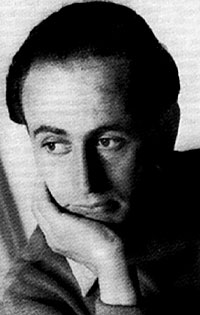 |
|
Photo courtesy of the German Studies Deparment
|
Famed poet Paul Celan will be the topic of a discussion sponsored by the German Studies department.
|
|
By Paul Iiams
Arizona Daily Wildcat
Thursday November 14, 2002
Poetry readings offer insight into poets' souls and expose audience to variety of poetry
Poetry can be seen as the language of the tormented soul by some audiences and as the language of the romantic by others. Haunting prose reveals not only the writers but also the reader's inner demons and desires.
For those who cannot get enough quality poetry in their diet, Wednesday, Nov. 20 will be a virtual smorgasbord of quality verse.
The department of German Studies, along with the Poetry Center, will be holding a lecture to discuss the works of famed poet Paul Celan.
Celan, who was the son of Romanian Holocaust victims, became known as the leading Holocaust poet with his poem "Todesfuge."
This poem, known in English as "Death Fugue" quickly became the most famous lyric poem to come out of the Holocaust era. It also became what Celan was most known for until after his death, when the rest of his work came into focus.
"Since his death by suicide in Paris, 1970, there has been a growing recognition that the vast majority of his poems have no direct connection with the Holocaust," said Thomas Kovach, head of the German Studies department. "His body of work easily justifies his rank as one of the major poets of the twentieth century in any language."
The featured speaker for the lecture is Dr. Hans-Michael Speier, who is widely regarded as one of the leading critics of Celan. He is the editor of the "Celan Yearbook," and has published in-depth readings on Celan's work.
According to Kovach, Celan's poetry is "notoriously difficult." He recommends that close reading by an expert would be enormously helpful in understanding the poetry. This task will fall into the capable hands of Speier.
Speier, a literary scholar who has taught at universities in both Germany and the United States, will be performing the in-depth reading of Celan's work in room 212 at the Aerospace and Mechanical Engineering building, 1130 N. Mountain Ave. His reading is meant to help people understand the complexities of Celan's work.
"A close reading by an expert like Speier should be helpful for anyone interested in twentieth century poetry," Kovach said.
In addition to the lecture about Paul Celan, the Poetry Center is sponsoring an undergraduate student poetry reading. The reading, which starts at 8 p.m. in the Modern Languages auditorium, will feature six undergraduates, four of whom are recipients of the Hattie Lockett Award. The award, according to Poetry Center assistant director Frances Sjoberg, is a major accomplishment for the students.
"The winners of the Lockett Award · is presented annually to students who, in the fall of their senior year, are judged to have demonstrated the greatest promise as poets," she said.
The winners, who were judged anonymously, received a $300 dollar prize and the chance to present their works at the undergraduate reading. This chance, to some, is a very important step in the process of becoming a poet.
"To be able to read to my peers, teachers, and poets (and to have their feedback) makes much more of an impact on my path," said Danny Clifford, a creative writing senior.
But the money did help. In addition to being able to participate at the reading, creative writing senior Lydia Hallay said the award helped "delay job-hunting for a few more weeks."
These two readings will give people the chance to see something that they may not be able to view that often. On the one hand is a poet regarded as one of the greatest poets of the modern era, and on the other, a group of up-and-comers who very well may be on their way to that lofty status.

